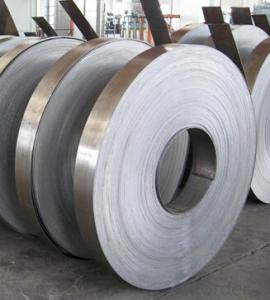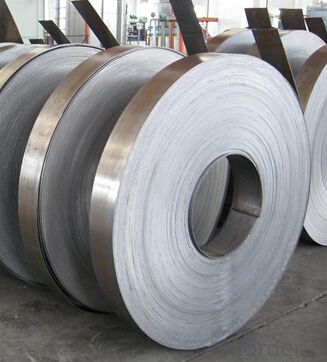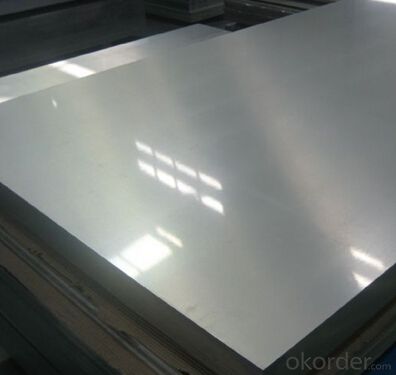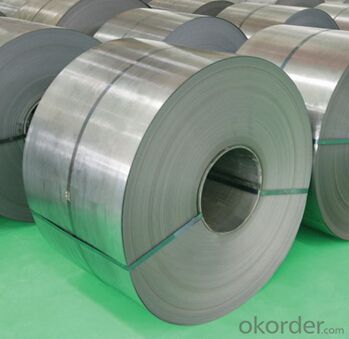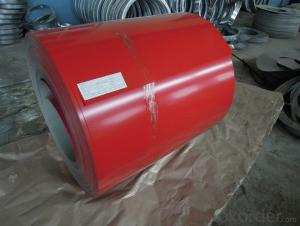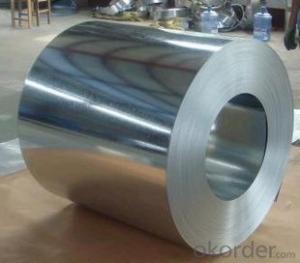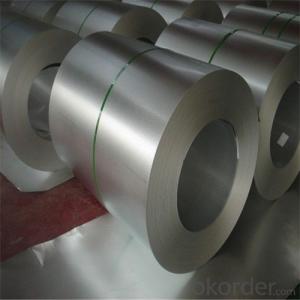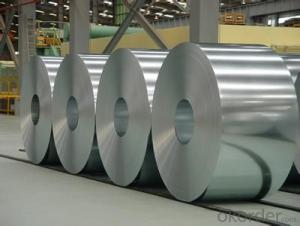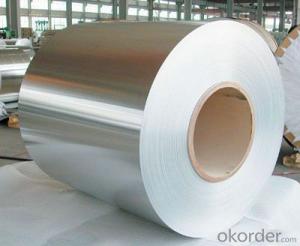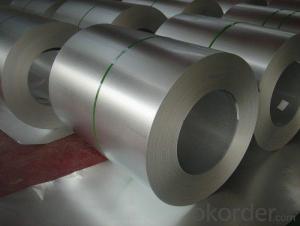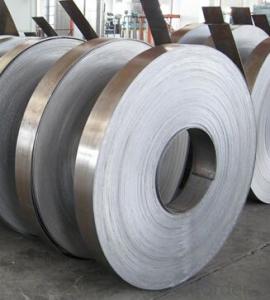the Hot-dip Aluzinc Steel of Good Quality
- Loading Port:
- China main port
- Payment Terms:
- TT OR LC
- Min Order Qty:
- 25 m.t.
- Supply Capability:
- 10000 m.t./month
OKorder Service Pledge
OKorder Financial Service
You Might Also Like
Specification
1. Description of the Hot-dip Aluzinc Steel:
Hot-dip aluzinc steel structure is composed of aluminum-zinc alloy, consisting of 55% aluminum, 43% zinc and 2% at 600 ℃ silicon solidification temperature and composition, the entire structure is made of aluminum - iron - silicon - zinc, to form a dense quaternary crystals an alloy.
Hot-dip aluzinc steel has many excellent features: strong corrosion resistance, is three times the pure galvanized sheet; zinc surface with beautiful flowers, can be used as a building outside board.
Applications of hot-dip aluzinc steel:
1)Building: roof, walls, garages, soundproof walls, pipes and modular housing.
2)Farm: barn, sheds, silos, piping and other greenhouse.
3)Automotive: muffler, exhaust pipes, wiper accessories, fuel tank, truck boxes, etc.4)CRT-proof band, LED backlight, electrical cabinets, etc.
5)Appliances: refrigerator back, gas stove, air conditioners, microwave oven, LCD frame,
6)Other: breaking heat insulation cover, heat exchangers, dryers, warm water, etc.
2.Main Features of the Hot-dip Aluzinc Steel:
• Excellent corrosion resistance
• High temperature oxidation resistance
•Beautiful appearance
•Surface coating
•Cost-effective
• High hot reflectance
• Good manufacturability
3.Hot-dip Aluzinc Steel Images
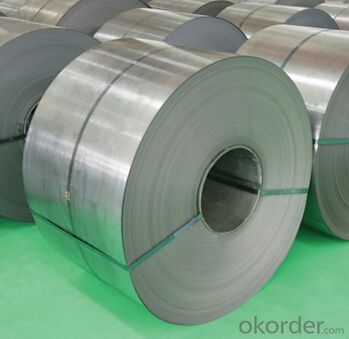
4.Hot-dip Aluzinc Steel Specification
Available Specification
HOT-DIP ALUZINC STEEL COILS | |||
COMMERCIAL QUALITY | ASTM A792M-06a | EN10327-2004 | JIS G 3321:2010 |
STRUCTURE STEEL | SS GRADE 230 SS GRADE 255 SS GRADE 275 SS GRADE 340 SS GRADE 550 | S250GD+AZ S280GD+AZ S550GD+AZ | SGLC440 SGLC490 SGLC570 |
5.FAQ of Hot-dip Aluzinc Steel
We have organized several common questions for our clients,may help you sincerely:
1.What advantages does your company have?
Cement : Annual capacity of 400 million tons, No. 1 in the world
Fiberglass: Annual capacity of 1 million tons fiberglass, No. 1 in the world.
Composite Materials — Carbon Fiber: Annual capacity of 10,000 tons PAN precursor and 4,000 tons carbon fiber, No. 1 in China
2.Could you let me approach about your company in Dubai?
Located at Jebel Ali Free Zone in Dubai, CNBM Dubai Logistics Complex is adjacent to -Jebel Ali sea port-the largest port in UAE and Al Maktoum Airport-the largest airport in the world, which covers an area of 50,000 square meters, including an fully enclosed warehouse by 10,000 square meters, an open yard by 25000 square meters, and 13 standard unloading platform. CNBM Dubai Logistics Complex formally put into operation on August 1, 2013. Dubai Logistics Complex will commit itself to build the most professional and most influential building materials distribution center of China’s building materials industry in the UAE and throughout the Middle East and Africa.
3.What advantages do your products have?
Firstly, our base material is of high quality, Their performance is in smooth and flat surface,no edge wave ,good flexibility.
Secondly, high quality zinc ingoats, 97.5% zinc,1.5% silicon,1% others, the same zinc coating measured by metal coating thickness or by zinc weight
Thirdly, high precision: Tolerance strictly according to ASTM or JISG standard even more rigid.
We have full stes of testing equipment(for t best, cupule,chromatism,salt spray resistance, etc) and professional engineers.
- Q: How are steel coils used in the production of gutters and downspouts?
- Steel coils are used in the production of gutters and downspouts by being shaped and formed into the desired size and shape of the gutters and downspouts. The coils are unrolled and passed through a roll-forming machine, which cuts and bends the steel into the required profile. This process allows for the efficient and cost-effective production of gutters and downspouts with high durability and strength, ensuring their ability to withstand various weather conditions.
- Q: What are the dimensions of steel coils used in the metal furniture industry?
- The dimensions of steel coils used in the metal furniture industry can vary depending on the specific requirements of each manufacturer. However, commonly used dimensions include coil widths ranging from 24 to 60 inches (61 to 152 cm) and coil diameters ranging from 36 to 72 inches (91 to 183 cm). The thickness of the steel coils can also vary, typically ranging from 0.020 to 0.250 inches (0.05 to 0.64 cm). These dimensions allow manufacturers to efficiently produce various types of metal furniture, such as chairs, tables, and cabinets, by utilizing the steel coils as raw materials for their production processes.
- Q: How can I arbitrate quality of steel before purchasing it??
- The quality of the alloy can be very well be judged by its appearance and lustrous surface. The more luster on the surface the more refine will the steel be. To judge its tenacity and endurance, the alloy can be subjected to a series of procedures involving stress and shock. The reaction to these processes can determine whether the steel be fit for the purpose required.
- Q: Can steel coils be coated with tin?
- Yes, steel coils can be coated with tin.
- Q: ok I got a dpms ar 15 and all i have put though it is good brass 223 ammo but is it ok to shoot the old crappy steel cased wolf ammo out of it will it hurt its function or will it hurt it cosmetically?
- The primary complaint about wolf steel cased stuff besides it being dirty is that is wears out the chamber and extractor faster than brass. That is not true. It would be true if the cases were actually steel instead of a mixture that has a hardness that is close to brass. Now to prove how pervasive this myth is I expect a minimum of 4 thumbs down for this statement alone. In any case the only issue is that is you do use steel cased ammo the chamber has to be better cleaned. The residue left behind from the coating on the steel casings will build up. If you keep firing the cheap steel cased stuff this tend to be less of an issue but when you use brass cased ammo without cleaning the chamber out or in the same session once it heats up the stuff will actually grip the brass tightly causing case head tears. And your only option is to wait for the gun to cool down yank it out by hand because at that point the casing is in essence glued into the chamber.
- Q: How are steel coils processed?
- Steel coils are processed through a series of steps that include uncoiling, levelling, cutting, and recoiling, ensuring the steel is transformed into the desired shape and size for various applications such as construction, automotive, and manufacturing industries.
- Q: What is the role of steel coils in the production of pipes and tubes?
- Steel coils are an essential component in the production of pipes and tubes as they serve as the raw material for manufacturing. The coils are unwound and then shaped into the desired pipe or tube form through various processes such as rolling, bending, and welding. The steel coils provide the necessary strength, durability, and structural integrity required for the pipes and tubes to withstand high pressures, extreme temperatures, and other demanding conditions.
- Q: I want to hear from those who own a scandium revolver. I know that scandium makes for a much lighter gun than steel, but how do they hold up durability-wise? Is their lifespan shorter than a comparable steel revolver?
- Not that I have ever heard. I have a pd340 thats about 3 yrs old, has about a thousand .38 rounds through it with no noticable loosening of the crane or anything. FWIW, the weight savings in a J frame is only a few ounces over an airweight, but the cost is almost double. Check out the SW 638 or 438.
- Q: How are steel coils used in the manufacturing of machinery?
- Steel coils are used in the manufacturing of machinery as they provide a reliable and durable material for various components and structures. These coils are often shaped, cut, and formed into desired parts such as gears, shafts, frames, and supports. The high strength and versatility of steel coils allow them to withstand heavy loads and harsh conditions, ensuring the machinery's efficiency and longevity.
- Q: How do steel coil manufacturers minimize waste and maximize efficiency?
- Steel coil manufacturers minimize waste and maximize efficiency by implementing various strategies such as optimizing production processes, recycling and reusing scrap materials, adopting advanced technologies for energy conservation, and implementing lean manufacturing principles to eliminate unnecessary steps and reduce downtime. They also focus on continuous improvement, employee training, and regular maintenance of equipment to ensure smooth operations and minimize waste generation.
Send your message to us
the Hot-dip Aluzinc Steel of Good Quality
- Loading Port:
- China main port
- Payment Terms:
- TT OR LC
- Min Order Qty:
- 25 m.t.
- Supply Capability:
- 10000 m.t./month
OKorder Service Pledge
OKorder Financial Service
Similar products
Hot products
Hot Searches
Related keywords
